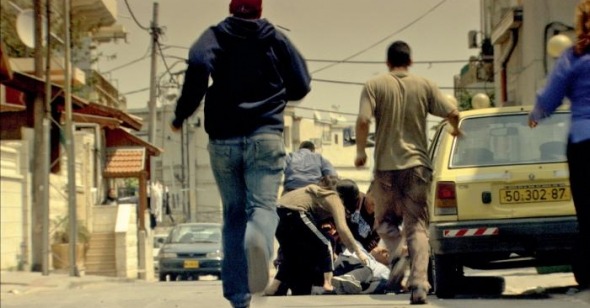No Exit
by Eric Hynes
Ajami
Dir. Scandar Copti and Yaron Shani, Israel, Kino Releasing
Ajami gets right to the tragic heart of the matter. Before the viewer knows what or whom he’s watching, a young boy is gunned down in the middle of a city street in broad daylight. Though a backstory is soon provided, the incident truly and crucially never makes sense. Revenge, recompense, clumsy justice, even apparently legitimate legal proceedings provide a measure of context and set the rest of the narrative in motion, but the brutal fact of the murder is never gotten over. Violence will return, again and again over the course of the film, but it is not to be justified by theoretical or political abstractions, and its impact is never softened. For all of its stories, characters, and perspectives, Ajami is essentially a sustained gaze into a widening, all-encompassing trap. Life is cheap, death is random, and no one is safe.
Co-directed by Yaron Shani, an Israeli Jew, and Scandar Copti, an Israeli-born Palestinian, Ajami, which has been nominated for an Academy Award in Best Foreign Language Film, thankfully bears no trace of political compromise or pandering parity, and is instead a sustained cry of urgent despair. The film proceeds in chapters and gradually intersected strands: an Arab-Israeli family becomes imperiled and financially ruined by a petty vendetta; a Palestinian works illegally in Jaffa to pay for his mother’s surgery; a Jewish cop struggles to remain impartial on the job after his younger brother has gone missing; a Palestinian hopes to marry a Jewish woman while another falls for a Christian; paths cross, plots are hatched, messes get messier.
As an interconnected narrative, Ajami has more in common with the beehive sociology of Gomorrah than the contrived hysteria of Babel or Mammoth. But the film still slips into overdetermination. Its final chapter in particular stakes emotional pay-off on surprise last-minute connections between loose narrative wires, providing an odd formal relief from what had been a deliberate and morally meaningful chaos. The basic problem with multistrand dramas remains the incompatibility between sober realism and heavy-handed, master-of-puppets plotting. Structure corrupts mise-en-scène, macro demeans micro. The best of the bunch, to which Ajami belongs, keep the audience yoked into ground-level experience without permitting too much in the way of allegorical or sociopolitical distance.
As did Gomorrah, Ajami wisely eliminates melodramatic interference by populating the screen with nonactors. These performers, who are mostly young men and boys from the Jaffa’s Ajami neighborhood, refrain from telegraphing emotion or giving characters a convenient shape, and remain essentially (and respectfully) unknowable. According to the filmmakers, cast members worked without scripted dialogue and moved through the events of the film chronologically (similar to Andrea Arnold strategy on Fish Tank), so that emotions could gather momentum and function causally. The finished film scrambles time yet preserves the scary intensity of recorded action. Much footage was captured in documentary-like single takes.
For a film that offers various and shifting perspectives, Ajami does well by avoiding convenient or representational sides of the Arab-Israeli conflict, a strategy that emphasizes community and complex environments over superficial distinctions; religious, ethnic, and sociological differences are subtle—to the untrained eye they veer toward the inscrutable. Real differences exist, of course, and have significant implications and repercussions, but here they seem inherited and ingrained, and thus all the more intractable. The onscreen Ajami is an embroiled, bewildering, and untenable place, and Shani and Copti succeed in nesting the audience deeply inside of it. An hour into the film a neighborly dispute over noisy sheep swiftly escalates into murder, and by then the incident seems both genuinely shocking and somehow inevitable. Everyone, from young to old, Muslim, Jewish, and Christian, lives on the verge. Regardless of vantage, Ajami is all edge.
